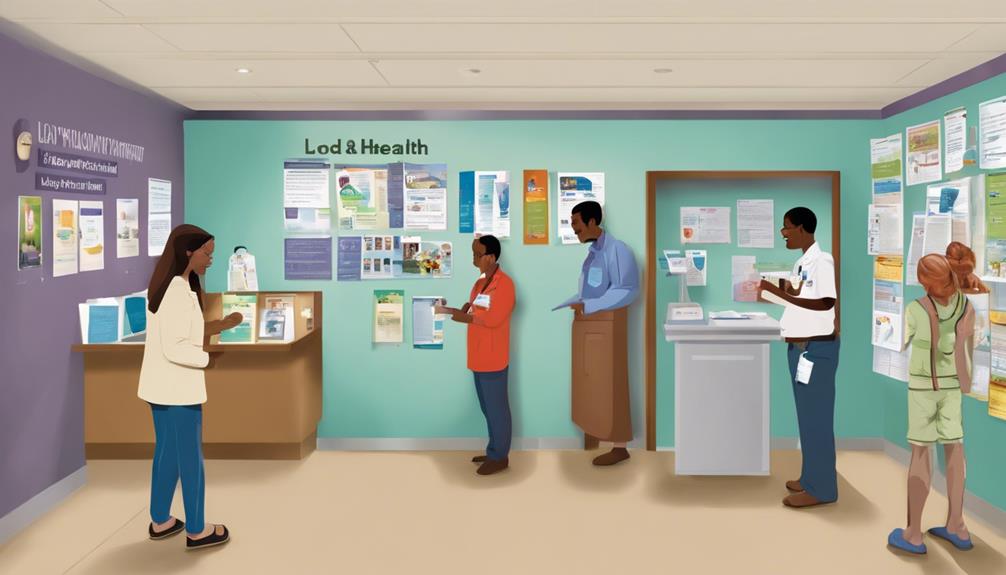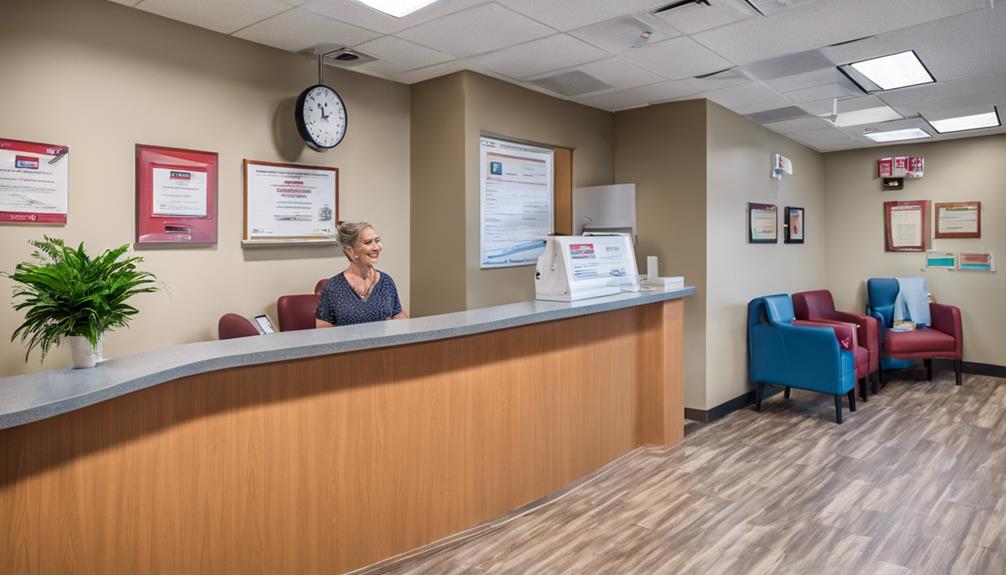You can obtain a health certificate from several sources. Start by contacting your local health department, which issues various certificates and provides necessary guidance. Hospitals and urgent care facilities also conduct required health assessments and can issue certificates upon completion. Community health centers may offer services at sliding scale fees, making them more accessible. Don't overlook online telehealth options for convenience. If you're seeking a health certificate for your pet, veterinary clinics can help as well. Explore these options to determine the best fit for your needs, and discover even more valuable information along the way.
Local Health Departments

When seeking a health certificate, your first step should be to contact your local health department, as they typically oversee the issuance of these documents in your area. Local health departments play a significant role in enforcing health regulations and guaranteeing public safety. They can provide you with detailed information about the specific certificate types available, including food handler permits, vaccination records, and health clearances for employment or travel.Is Bikram Yoga Good For YouHow To Hem Yoga Pants
During your initial contact, inquire about the application process, required documentation, and any associated fees. It's essential to understand that each jurisdiction may have different requirements based on state and local health regulations. Some health departments may offer online applications or specific appointment systems, streamlining the process for you.
Be prepared to provide personal information, such as proof of identity and any medical records relevant to the certificate you're applying for. Familiarizing yourself with these guidelines will help guarantee that you receive your health certificate promptly and efficiently.
Additionally, remember to check for any updates or changes in regulations, as these can affect the issuance process.
Hospitals and Clinics
Hospitals and clinics often provide health certificates as part of their services, making them a valuable resource for individuals needing documentation for employment, travel, or other purposes. To obtain a health certificate from a hospital or clinic, you'll need to follow specific health certificate procedures.
First, contact the facility to confirm their hospital requirements, as these may vary. Generally, you'll need to schedule an appointment for a medical examination, which may include a physical assessment, medical history review, and necessary lab tests. Be prepared to provide identification and any relevant medical records.
During your visit, the healthcare provider will evaluate your health status and determine if you meet the criteria for the certificate. Once the assessment is complete, and if you're deemed fit, the provider will issue the health certificate, often on official letterhead.
It's advisable to inquire about any associated fees and the time frame for receiving the certificate. By understanding these health certificate procedures and hospital requirements, you can streamline the process and guarantee you obtain the necessary documentation efficiently.
Urgent Care Facilities

When considering urgent care facilities for your health certificate, it's crucial to understand the services they offer, including specific health assessments and tests.
You'll also need to factor in cost considerations and whether your insurance covers these services.
Additionally, evaluate the accessibility and hours of operation to guarantee you can visit at your convenience.
Services Offered at Facilities
Urgent care facilities provide a range of services designed to address non-life-threatening medical issues efficiently, guaranteeing you receive timely care outside of regular office hours. These facilities often offer health screenings, which are essential for early detection of various conditions. Common screenings might include blood pressure checks, cholesterol levels, and diabetes assessments.
In addition to routine health screenings, urgent care centers also assist with various certification processes. Whether you need a health certificate for employment, school, or travel, these facilities can provide the necessary evaluations. Typically, a healthcare professional will perform an assessment, which may include a physical examination and pertinent lab tests, depending on the requirements.
Moreover, urgent care facilities are equipped to handle minor injuries and illnesses, such as sprains, fractures, and infections. They can administer vaccinations, conduct X-rays, and provide immediate treatment for allergic reactions.
Their extended hours and range of services make them a convenient option when you need prompt medical care without the long wait times often associated with emergency rooms. Always verify the specific services offered at your local urgent care facility to guarantee they meet your needs.
Cost Considerations and Insurance
Understanding the cost of services at urgent care facilities and how insurance coverage applies can greatly impact your decision-making process when seeking medical care. Urgent care centers typically charge a flat fee for services, which can vary based on location and the complexity of your visit. It's essential to inquire about these costs beforehand to avoid unexpected financial burdens.
Your insurance coverage plays a significant role in determining your out-of-pocket expenses. Many urgent care facilities accept a variety of insurance plans, but coverage can differ widely. Verify with both your insurance provider and the facility to confirm that the services you need are covered. Some plans may have higher copays for urgent care visits compared to primary care.
Additionally, consider other cost factors such as diagnostic testing, procedures, and follow-up care, which can add to your total expenses. If you're uninsured or underinsured, ask about self-pay discounts that many facilities offer.
Location Accessibility and Hours
Accessing urgent care facilities conveniently requires considering their locations and operating hours, which can greatly influence your ability to receive timely medical attention.
To guarantee you choose a facility that meets your needs, evaluate your transportation options. Facilities located near public transit routes or major roadways can facilitate quicker access, especially during emergencies.
Make certain to check the facility hours before your visit. Many urgent care centers operate extended hours, often including evenings and weekends, which can be vital if you need care outside of regular office hours. Some facilities may even offer 24/7 service, allowing for greater flexibility in seeking treatment.
It's also beneficial to call ahead or check online for real-time wait times, verifying that you won't have to spend unnecessary time waiting for care.
If you're in an area with multiple urgent care options, consider their proximity to your home or workplace, as this can further minimize travel time.
Online Health Services
Many online health services offer convenient options for obtaining health certificates, allowing you to complete necessary assessments from the comfort of your home. You can easily schedule an online appointment through their platforms, which often include user-friendly interfaces.
During your telehealth consultations, a licensed healthcare provider will evaluate your health status, ensuring that you meet the specific requirements for the health certificate. It's crucial to prepare for these consultations by having any relevant medical records or information readily available.
Typically, the process begins with filling out an online questionnaire regarding your health history and current symptoms. Once submitted, you can book your telehealth consultation, where the provider will guide you through any additional assessments required.
After the consultation, the healthcare provider will issue your health certificate if you meet the necessary criteria. Most online services will send this document electronically, ensuring you receive it promptly.
Remember to choose reputable online health services that are accredited and have positive reviews. Doing so can help guarantee that you receive a valid and reliable health certificate.
Community Health Centers

Community health centers provide a variety of essential services, including health certificates, tailored to meet the needs of local populations.
To access these services, you must meet specific eligibility requirements, which can vary by location.
Understanding where these centers are located and their accessibility can greatly streamline your process in obtaining a health certificate.
Services Offered at Centers
Health centers provide a range of essential services designed to meet the diverse needs of individuals, including routine check-ups, vaccinations, and health education.
In addition to these core offerings, many centers also assist with various health certificate types, which are often required for school enrollment, employment, or travel.
When you visit a community health center, you can expect to receive guidance on the application process for obtaining these certificates. This process typically involves filling out necessary forms, providing proof of vaccination, and undergoing a health assessment.
Moreover, health centers often offer specialized screenings and diagnostic services, ensuring you receive extensive care tailored to your needs.
Educational programs on nutrition, exercise, and disease prevention are also common, empowering you with knowledge to make informed health choices.
Eligibility and Requirements
To obtain a health certificate at a community health center, you need to meet specific eligibility criteria and provide necessary documentation. Generally, you must be a resident of the area and demonstrate a valid reason for requesting the certificate, such as employment or school requirements.
The application process typically involves filling out a form provided by the health center, where you'll need to include personal information such as your name, address, and contact details. Document requirements often include proof of identity, like a government-issued ID, and any relevant medical records that support your request for the health certificate.
In some cases, you may also be required to undergo a health assessment or screening, depending on the type of certificate you're seeking. Be prepared to provide additional documents, such as vaccination records or proof of previous medical evaluations, if applicable.
It's advisable to contact the community health center beforehand to confirm the specific eligibility criteria and document requirements, as these can vary by location. Following these guidelines will help guarantee a smooth application process for your health certificate.
Locations and Accessibility
Finding a community health center near you is crucial for obtaining your health certificate, as these facilities often provide the necessary services and support for your application process. Community health centers are designed to offer accessible healthcare services, including vaccinations and health assessments, which are typically required under health certificate regulations.
To locate a community health center, you can utilize online resources such as the U.S. Department of Health and Human Services website or your local health department's directory. These platforms provide detailed information on nearby centers, including their services, hours of operation, and contact details.
When you visit a community health center, make sure you bring any required documentation, such as identification and previous health records, to streamline the application process. Health professionals at these centers are knowledgeable about the specific regulations governing health certificates and can guide you through the necessary steps.
Veterinary Clinics
Veterinary clinics are vital for obtaining a health certificate, as they provide the necessary examinations and documentation required for pets traveling or participating in specific activities. When you visit a veterinary clinic, your pet will undergo a thorough health assessment to guarantee they meet the health standards set by authorities.
During this examination, the veterinarian will evaluate your pet's overall health, looking for signs of illness or any conditions that could affect their travel or participation in activities. It's essential to have up-to-date vaccination records, as these documents are often required to prove your pet's health status. Make certain to bring these records to your appointment, as they can expedite the process of obtaining your health certificate.
After the examination, if your pet is deemed healthy, the veterinarian will issue a health certificate, often accompanied by the necessary vaccination endorsements. Keep in mind that some destinations may have specific requirements, so it's wise to check these ahead of time.
Employers and Educational Institutions

Employers and educational institutions often require health certificates to guarantee the well-being of individuals within their environments, particularly in settings where health and safety are paramount. These certificates serve as proof that you meet specific health standards, which is essential for compliance with employment requirements and educational regulations.
If you're seeking employment in sectors like healthcare, food service, or education, you'll likely need to provide a health certificate. This document verifies that you're free from communicable diseases and are fit for the job. To obtain a health certificate, you should visit a licensed healthcare provider. They'll conduct necessary examinations and tests, ensuring you meet the health criteria relevant to your field.
For students, educational institutions may require health certificates to confirm vaccinations and general health status, especially for participation in sports or other physical activities. Be aware of the specific regulations your institution mandates, as requirements can vary widely.
Conclusion
In conclusion, obtaining a health certificate can be achieved through various avenues, including local health departments, hospitals, and urgent care facilities.
You might also consider community health centers and online services for convenience.
Don't overlook veterinary clinics for pet health certifications if needed.
Always check with your employer or educational institution for specific requirements.
By following these guidelines, you can guarantee you acquire the necessary documentation efficiently and effectively.
